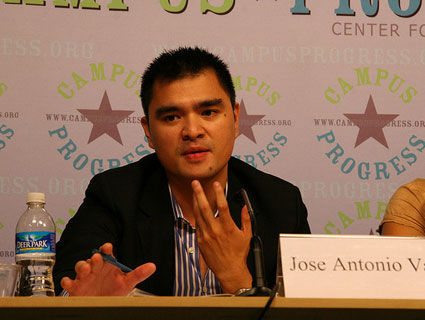
<a href="https://www.flickr.com/photos/opportunityagenda/6916335320/in/photolist-59igPa-dohCnh-bL6hee-bL6jR2-bxaZTo-bL5KGc-bL4ZYX-bxb1E5-bxb2wG-bxb51Y-bxagch-bL4UUX-bL5JUx-bxb5R3-bxb1jf-bL5Lx2-bxaiVL-nk1UCU-nk1Piz-nBhaKy-nBhaHQ-nk1UjN-nDhGEi-nk1Pi4-nk1P3p-nDhHdH-nBvwAZ-nk1PxH-nBvpPm-nk25HF-nk1Pcx-nk1PeB-nk25zV-nBvwFP-nBhb51-nzsP3L-nk1Pd4-nBvwV6-nk1Pmv-nk1Uiq-7LF83z-nDhH9K-nk1UAj-nDhGNe-nBhbnq-nBhaUm-nk25E4-nk1WfQ-nBvwEB-nBdDVt">The Opportunity Agenda</a>/Flickr
On Tuesday morning, Jose Antonio Vargas, one of the most prominent and vocal undocumented immigrants in the United States, was detained at a Texas airport after traveling there to report on the plight of unaccompanied minors crossing the border. The Border Patrol took him into custody when he showed them a Filipino passport and no other form of identification. This was one of the few times Vargas, who self-identifies as the “most privileged” undocumented immigrant in the US, has had that privilege seriously questioned. He was released on Tuesday evening and issued a statement through his nonprofit organization, Define American:
I’ve been released by Border Patrol. I want to thank everyone who stands by me and the undocumented immigrants of south Texas and across the country. Our daily lives are filled with fear in simple acts such as getting on an airplane to go home to our family.
Vargas reminds those watching his case that he is representative of so many more undocumented children. But there are also many reasons why his is a special case—and why he won’t be deported:
- He’s a Pulitzer Prize-winning journalist and a celebrity.?
- He’s been detained, and released, before: Two years ago, a year after he revealed his status as an undocumented Filipino immigrant, Vargas was driving through Minneapolis without a legal license while wearing headphones, according to MinnPost. Although the Hennepin County Sheriff’s Office was signed up for a Bush administration initiative called Secure Communities that encourages local law enforcement to hold booked undocumented immigrants for ICE, Vargas was released after roughly five hours. It’s unclear how much information authorities had about Vargas’ citizenship, though MinnPost points out that it was unusual for police to haul him in, given that those suspected of driving without a license tend to be issued a citation on the scene.
- He’s dared the ICE to deport him, and it did nothing: As Vox points out, Vargas essentially surrendered to the feds in 2012 when he called ICE and “asked what the government wanted to do with him.” The agency declined to comment. Technically, they can come knocking anytime they want to deport him, and they have not done so.
- He’s not a priority: The Obama administration claims it prioritizes cases having to do with “national security, public safety, and border security,” including repeat offenders who have crossed the border after deportation, convicted criminals, and “recent border crossers.” Vargas doesn’t fit these descriptions, considering he’s been convicted of no crime and has lived in the United States since he was 12 years old. (Though CBP has its own policies on what constitutes a recent border crosser, prioritizing any unauthorized entry regardless of how long ago it occurred.)
- The courts are already backlogged: As MoJo‘s Stephanie Mencimer wrote earlier this week, immigration courts are drowning in cases, especially with the sudden influx of unaccompanied minors. There are currently 30 vacancies on the immigration bench, dozens more judges eligible for retirement, and a backlog of 375,503 cases—up 50,000 since 2013. A case like Vargas’ could’ve sat around for years before it was addressed.
- Prosecutorial discretion might have favored him anyway: Even if Vargas’ case were taken up by ICE, the government could have chosen at any time not to proceed. ICE can waive deportation in cases where a defendant has “positive priorities,” including status as a veteran, longtime US residency, a degree from a US college or university, or even just “ties to the United States,” including a “role in the community” or “work as a volunteer.” Vargas arrived as an undocumented minor and was unaware of his status until he was older. He’s been a journalist since he was 17. He’s a graduate of San Francisco State University. And now he’s the founder of nonprofit advocacy group Define American. Not only does he fit many of the positive criterion, he doesn’t fit into the clearly defined “negative” categories: He is not a clear threat to national security, a gang member, or a convicted criminal.
- He has a slew of lawyers, immigration groups, and public figures supporting him: Chris Rickerd, a policy council expert in the American Civil Liberties Union, says Vargas’ “equities are such that he should be allowed to continue his stay in the US.” Cristina Jimenez, a representative of the youth immigration group United We Dream, declared in a statement: “We stand in solidarity with Jose Antonio and demand for his immediate release, but we must remember that there are thousands of people along the border that live with this same fear every day.” New York City Mayor Bill de Blasio also announced his support for Vargas in a public statement Tuesday, describing him as an “exemplary man whose tireless work has helped raise awareness around the lives of millions of undocumented immigrants living on American soil” and encouraging authorities to use discretion when it came to his case.
- He’d be a giant headache when the government already has plenty. (See also No. 1.) We’ll just have to see if the outcry over Vargas’ release would be any less of a headache for the Obama administration than his deportation might have been.










